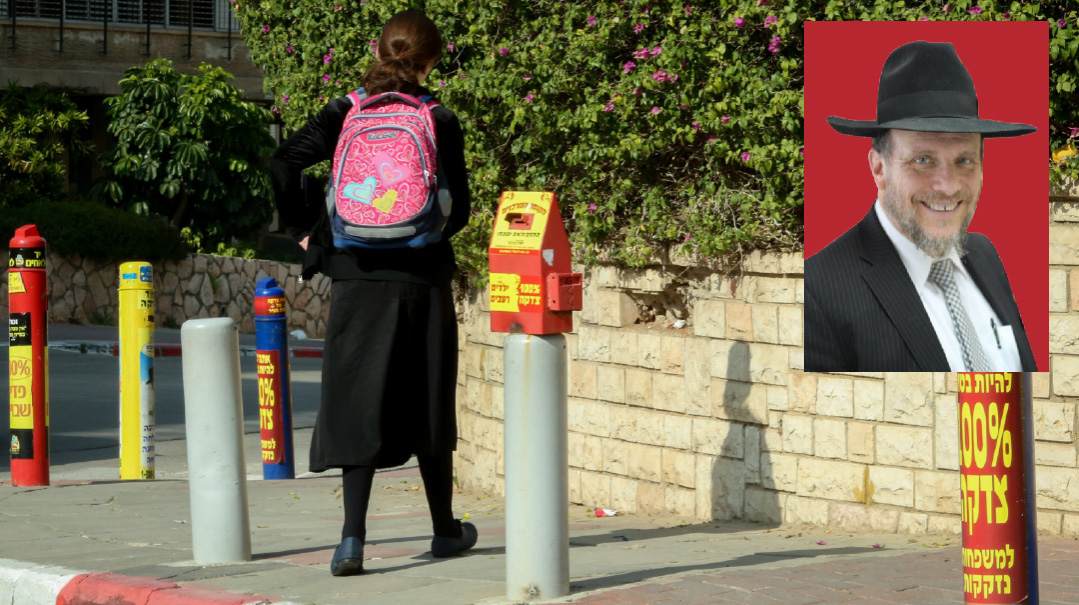“Is This Why We’re Supporting Our Young Couple?”

There is only one solution, one prescription that will enable us to win this cultural battle. Torah!

Question
Our daughter recently got married to a wonderful young man and has since moved to Eretz Yisrael. We committed to offering full support for five years, which isn’t easy for us at all. While my husband runs a successful business, after paying the bills and sending our daughter the monthly check, there is little left for us to put away.
My daughter sounds extremely happy, as does my son-in-law.
They’re constantly talking about their most recent trip to Netanya, at which restaurant they ate out, or which mall they visited on Motzaei Shabbos. While we’re thrilled that their life is running smoothly, these conversations always leave us feeling deeply disturbed — is this where all our hard-earned money is going? Why aren’t we hearing from our son-in-law about his latest siyum, or most recent chaburah? We have no problem with our children enjoying life, but their living in Eretz Yisrael is for a purpose — as is our sacrifice to support them. Is there any way we can communicate this to them without hurting their feelings?
Answer
You are raising a sensitive and important question. Let’s begin by addressing the general phenomenon of young people coming to learn Torah in Eretz Yisrael, and only afterwards will we focus on your specific question.
Every generation of our galus has had different challenges. There are those who complain about our generation — the materialism, the Internet, and the entire industry of entertainment and distraction. Indeed, the challenges are enormous; it is true that accessiblity to all the vices of the yetzer hara makes it difficult to live connected to ruchniyus. The permissiveness of the society that surrounds us creates an atmosphere that makes the nisyonos seemingly insurmountable for our children and often for ourselves.
There is only one solustion, one prescription that will enable us to win this cultural battle. Torah! Hashem has with infinite wisdom and chesed given our generation the means to build Talmudei Torah, yeshivos ketanos, yeshivos gedolos and kollelim, Bais Yaakovs, elementary schools, high schools and seminaries. Even small cities are blessed with Torah institutions educating the children.
But even within the milieu of limud haTorah there are varying levels of significance, and Chazal are quite clear in their instruction that “Ein Torah k’Toras Eretz Yisrael, v’lo chochmah k’chochmas Eretz Yisrael — There is no Torah like the Torah of Eretz Yisrael and no chochmah like the chochmah of Eretz Yisrael” (Bereishis Rabbah 16:4). See also Bava Basra 158: The “air” of Eretz Yisrael makes one smarter.
Rav Dessler points out (Michtav MeEliyahu, vol. 3, p. 196) that we can see this reality play itself out before our very eyes. We can see how young men and women who come to Eretz Yisrael for one year experience growth and connection that profoundly affects the trajectory of their lives. Watching the transformative power of Torah learning in Eretz Yisrael is one of the great wonders that give hope in our challenging world. Literally thousands of these young people, after experiencing the brilliance of Toras Eretz Yisrael, decide to spend more years in that very environment. Approximately 70 percent of the staff of all the American yeshivos and seminaries began their journey with a one- or two-year journey to Toras Eretz Yisrael.
When I came to Eretz Yisrael almost 45 years ago for a “taste of three months,” there were somewhat different degrees of present-day challenges. But even then, the extraordinary difference in standards, culture, and values was a powerful draw to a seeking heart. All the more so today. Every year that a boy, girl, or couple spends in Eretz Yisrael learning gives them strength and fortitude to survive the onslaught of the culture in which they will probably live when they go home.
Our children, who grew up in a world of plenty, where the average family eats out a few times a week, will not necessarily adapt to the more frugal Israeli lifestyle in the first year or two. The concern you have with your daughter and son-in-law’s lifestyle, that they are living it up on the “Baron’s checkbook,” might not be justified.
And the only effective method to verify what is really happening is communication. You have the absolute right to speak with your daughter and wonderful son-in-law about how you feel. Tell them that you need to hear more about the reasons they are in Eretz Yisrael alongside the nice and pleasant experiences in Netanya and the malls.
What you hear might surprise you. You might realize that your son-in-law is learning exceptionally well, and this is his way of taking a well-deserved break.
Another factor to consider is that if your daughter is telling you about these outings, that means they are occasions of note — they are not a part of her daily routine. So that in itself should offer you some comfort.
Before having a conversation about such a sensitive subject, consideration must be taken as to how this might affect your daughter’s marriage. Her spouse is not your child, and could easily feel judged or accused. The last thing you want to do is meddle in your child’s marriage. One option might be to have a third party, like a rav or rebbi, bring up the subject with sensitivity and respect.
Another idea may be to ask your daughter if you can discuss something sensitive just with her. Explain that you are not chas v’shalom trying to go behind her husband’s back; rather, out of respect for him, you want to discuss something just with her. You can then sound her out. Ask how they are doing in Eretz Yisrael? Are they accomplishing what they set out to do? Do they feel fulfilled and accomplished? Is there anything you can do to make their time even more successful? The answers to these questions should give you a better indication as to the real picture.
If, in fact, your fears turn out to be well-founded, it may be time to have a real discussion about the terms of your agreement. Nevertheless, it would still be necessary to make a serious evaluation before concluding that married children are taking advantage of the support they are receiving.
It’s true that these five years were never intended to be an extended vacation, but a chance for the couple to fill themselves up with Torah and mitzvos, purpose and direction. But remember, every couple on their level. Your son-in-law may not return home the next gadol hador, but all the learning and growth the couple achieves over the next five years that you are enabling with your support will be to your everlasting credit.
Regardless of what the conversation with your daughter reveals, the response must be one of sensitivity. If your daughter doesn’t feel happy, or that living in Eretz Yisrael isn’t giving her — or her husband — a sense of fulfillment, then that is probably as difficult for her as it is for you. In such a situation, criticism won’t go far; your daughter needs all the support you can give her to help navigate this challenge. On the other hand, if you come to understand that they are in fact growing, even if it’s not in the way you envisioned, then you must thank Hashem for that wonderful brachah.
Rabbi Zecharya Greenwald is a world-renowned educator and lecturer and the author of Preparing your Child for Success (ArtScroll/Mesorah). He founded Darchei Shalom Educational Center, an alternative high school for boys at risk, in Israel 33 years ago, and 23 years ago he founded Me’ohr Bais Yaakov Teacher’s Seminary in Jerusalem, where he currently serves as dean.
This column will appear monthly.
(Originally featured in Mishpacha, Issue 938)
Oops! We could not locate your form.







